How to Meet 35 Contact Hours Requirement With a PMP Training Bootcamp
Administered by PMI (Project Management Institute), PMP (Project Management Professional) certification is one of the most important industry credits that increase the marketability of project managers across industries. It is a testament to their top-notch project management skills and endorses their presence of mind, problem-solving skills, flexibility, and collaborative and leadership skills.
According to Project Management Institute, 35 contact hours of project management education is a non-negotiable eligibility to apply for the certification exam; a candidate must have 35 hours of experience before applying. While there are many ways to earn your required contact hours, PMP bootcamp training remains one of the most popular and easiest ways to earn them. Read on to find out the whats and whys of contact hours and how you can earn them with PMP bootcamp training.
Why Should You Consider PMP Certification?
With industries getting rapidly projectized, project manager is a job that is here to stay. Though the career objectives and aspirations of a conventional project manager and a PMP professional converge, a certified PMP professional brings more skills and techniques to the table than a non-certified professional. This is why there is a large-scale global demand for PMP certified managers.
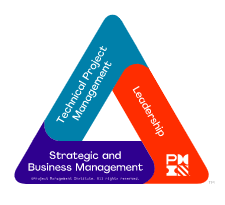
Source: PMI
PMP-certified professionals are not just into scheduling the tasks and giving them out to the team members; they also integrate the ideas of the entire team, facilitate on-time delivery, satisfy stakeholders, all while making sure the project stays within the budget. Aside from their unparalleled project management skills, employers can trust certified PMP professionals to help their teams meet targets and deadlines, ensuring client satisfaction and profitability in the process.
With PMP certification, you get unchallenged recognition anywhere in the world along with guaranteed career growth. The certification earns you 20 percent more pay than a non-certified project manager and attracts an impressive array of career opportunities. Your skills translate across all kinds of industries and projects, which makes you flexible.
Why Are Bootcamps Ideal for PMP Training?
Unlike self-paced learning experiences that require you to constantly motivate yourself to not stray away from your goals, PMP bootcamp training programs are immersive training environments led by industry veterans. This means you have unlimited access to expert insights, quality learning materials, and unconditional guidance. Bootcamps allow candidates to get hands-on experience in project management and offer simulated tests and mock interviews.
PMP Certification and 35 Contact Hours Requirement
What is a contact hour? One contact hour is equivalent to one hour of PMP training. According to PMI’s handbook for professionals, 35 contact hours need not clock in with a single training program or course; it can be the sum of multiple PMP courses or events you enroll for.
Even if you do not meet your instructor in person, your training hours are valid. That is, online PMP training programs enjoy the same value as classroom training programs. The Project Management Institute recognizes project management podcasts as valid.
No matter what your choice of training program, make sure your formal project management education covers the following topics:
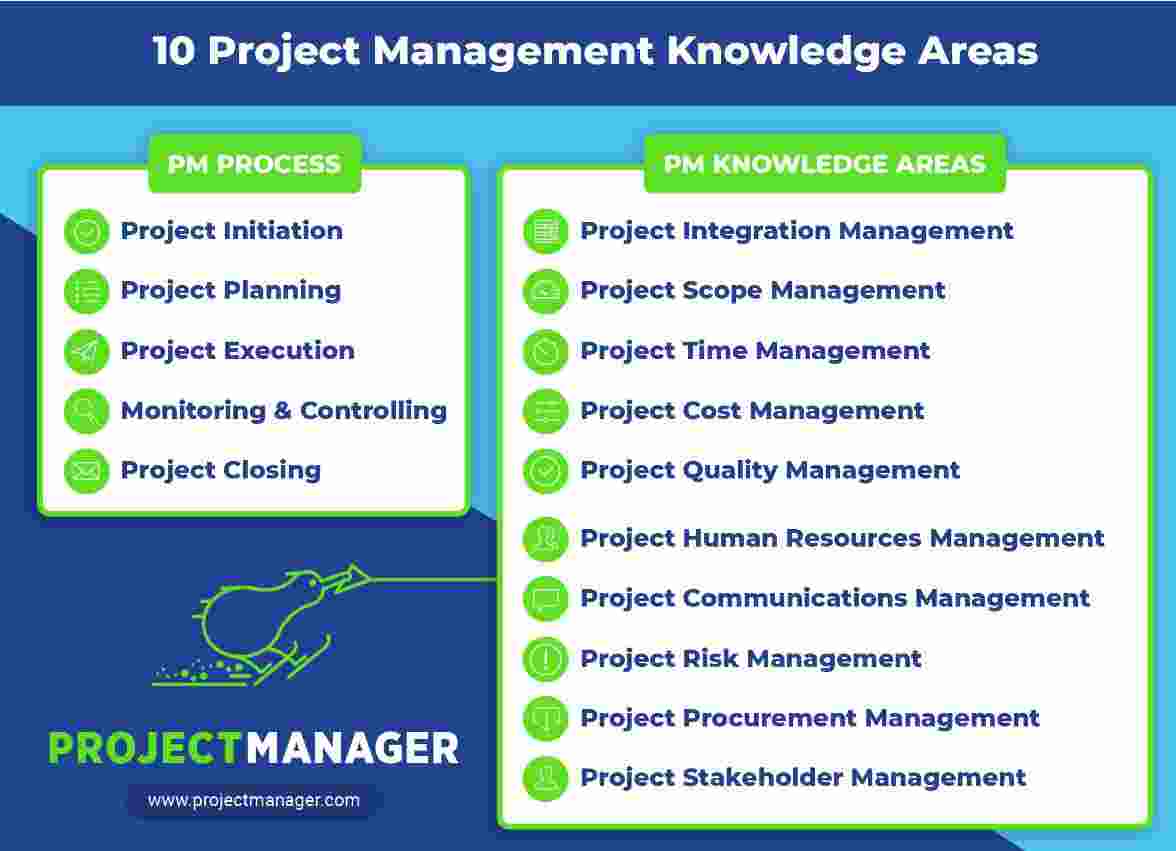
Source: ProjectManager
- Project procurement
- Project scope
- Schedule
- Project quality
- Budget
- Communications
- Risk
- Project integration management
Does Self-study Contribute to Your Contact Hours?
While well-structured, self-paced learning is a productive experience, Project Management Institute does not acknowledge self-learning as a credible training experience. Your self-learning hours, unfortunately, do not count. Formal education in project management is mandatory to apply for the PMP exam. This could be classroom training, virtual training, or online training led by reputable organizations.
PMP Eligibility Criteria
The PMP certification exam is certainly one of the most difficult professional exams. The exam’s duration could be off-putting, the syllabus is notoriously vast, the learning process is sophisticated, the questions are hard; there are endless reasons to feel discouraged. But all PMP aspirants will collectively agree that it is definitely worth it.
What makes a candidate eligible to take this prestigious exam?

- Education: A four-year degree or a secondary degree in any discipline; the secondary degree could be a high school diploma or an associate degree.
- Experience: A project manager has to read, write, and create well-structured reports. He or she must craft plans, understand concepts, have good judgment skills, and make effective decisions. A project manager needs to have hands-on experience in all aspects of project management; that is, from initiation to project completion.
A secondary degree holder needs to have
- 7500 hours of experience in directing and leading projects
- 35 contact hours of project management
A four-year degree holder needs to have
- 4500 hours of experience in directing and leading projects
- 35 contact hours of project management - Training: Apart from the mandatory 35 contact hours, a PMP aspirant needs to have 60 PDUs, both of which require proper guidance and training.
The Difference Between Contact Hours and PDUs
Students need to earn contact hours before they can apply for the PMP certification exam. The student accumulates PDUs or Professional Development Units after the PMP exam. PMP mandates 60 PDUs after the exam.
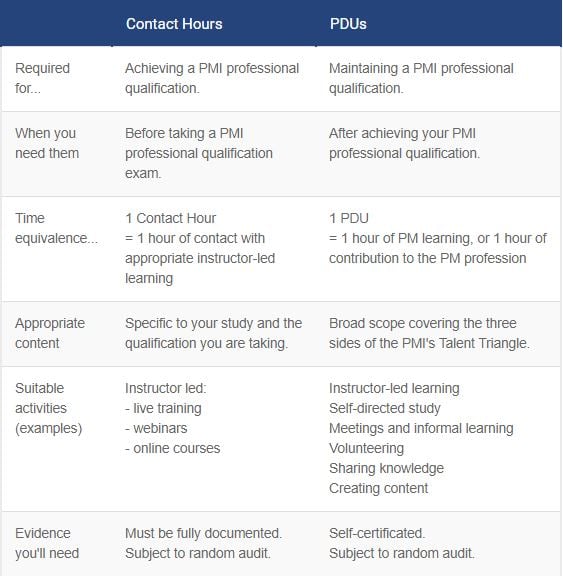
Source: OnlinePMCourses
PDU can fall under five categories:
- Formal Academic Education: This refers to formal academic education in various aspects of project management.
- Professional Activities: This includes publishing articles related to project management in journals, teaching project management, self-learning activities, developing courses, etc.
- PMI REP (Registered Education Providers): This can include attending courses provided by registered providers and attending chapter meetings.
- Volunteer Services: This refers to services offered to local chapters, charity organizations, and so on.
- Other Providers: Candidates can attend courses or seminars provided by organizations not registered with PMI.
Do Contact Hours and PDUs Expire?
This is the best part about project management certification training: Project management formal education hours have lifelong validity. This makes you eligible to apply for the PMP exam at any point in your career. But students must take 60 PDUs every three years to keep the certificate active, which is mandatory for continuing certification requirements or CCR.
How to Earn 35 Contact Hours?
Irrespective of the nature of training, it is important to document training hours. Contact hours can be the sum of hours spent learning in multiple events and classes or in a single course or program such as a bootcamp. Having your hours documented and your skills assessed will help you during PMP verification.
Here are some of the ways you can earn your 35 contact hours:
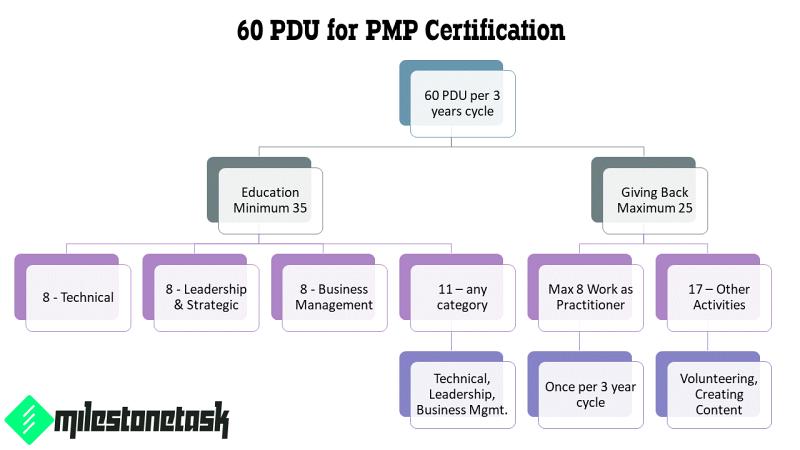
Source: Milestonetask
- Training Consultants or Companies: PMI recognizes attending training programs organized by companies specific to project management. Aspirants can take PMP training online or offline where candidates are tested for their management skills.
- Distance Learning: Distance learning is an ideal choice for candidates who want to complete their training conveniently from anywhere in the world, depending on your schedule. Just make sure that the training covers all aspects of project management, namely, procurement, budget, quality, scope, risk, communications, etc.
- University or College Education Programs: Academic programs offered by colleges and universities make a good option to earn your 35 contact hours for PMP certification. You can claim all the hours you spent learning project management-specific topics in these academic programs. The programs usually assess your skills at the end, which PMI will record as verification.
- Employer or Company-sponsored Programs: If you take part in your company’s project management training, project quality, budget, integration management, risks, and other allied aspects of project management, you can claim your hours. These events need to have an assessment at the end so you can document your hours and produce your claim for PMI verification.
- Registered Education Providers (REPs): If you head to the PMI website, you can search for registered education providers of project management, look for the courses that fit your needs, location preference, and schedule. The biggest advantage of choosing an REP is that PMP pre-approves the training.
- Chapter Meetings: You can find the schedules of your local PMI chapters or Communities of Practice (CoP) and take low-cost training programs. These communities are mostly industry-specific and focus on the project management skills of their respective industries. Make sure the meetings dedicate one hour to a training activity so that PMP will acknowledge your experience.
A PMP Training Bootcamp Is an Excellent Option for Earning Your Contact Hours
While there are so many options for a PMP aspirant to avail training, bootcamps remain one of the most sought-after training programs and one of the easiest ways to earn your contact hours. There are many registered companies that provide quality bootcamps to facilitate hands-on learning experiences in project management while promising 35 hours.
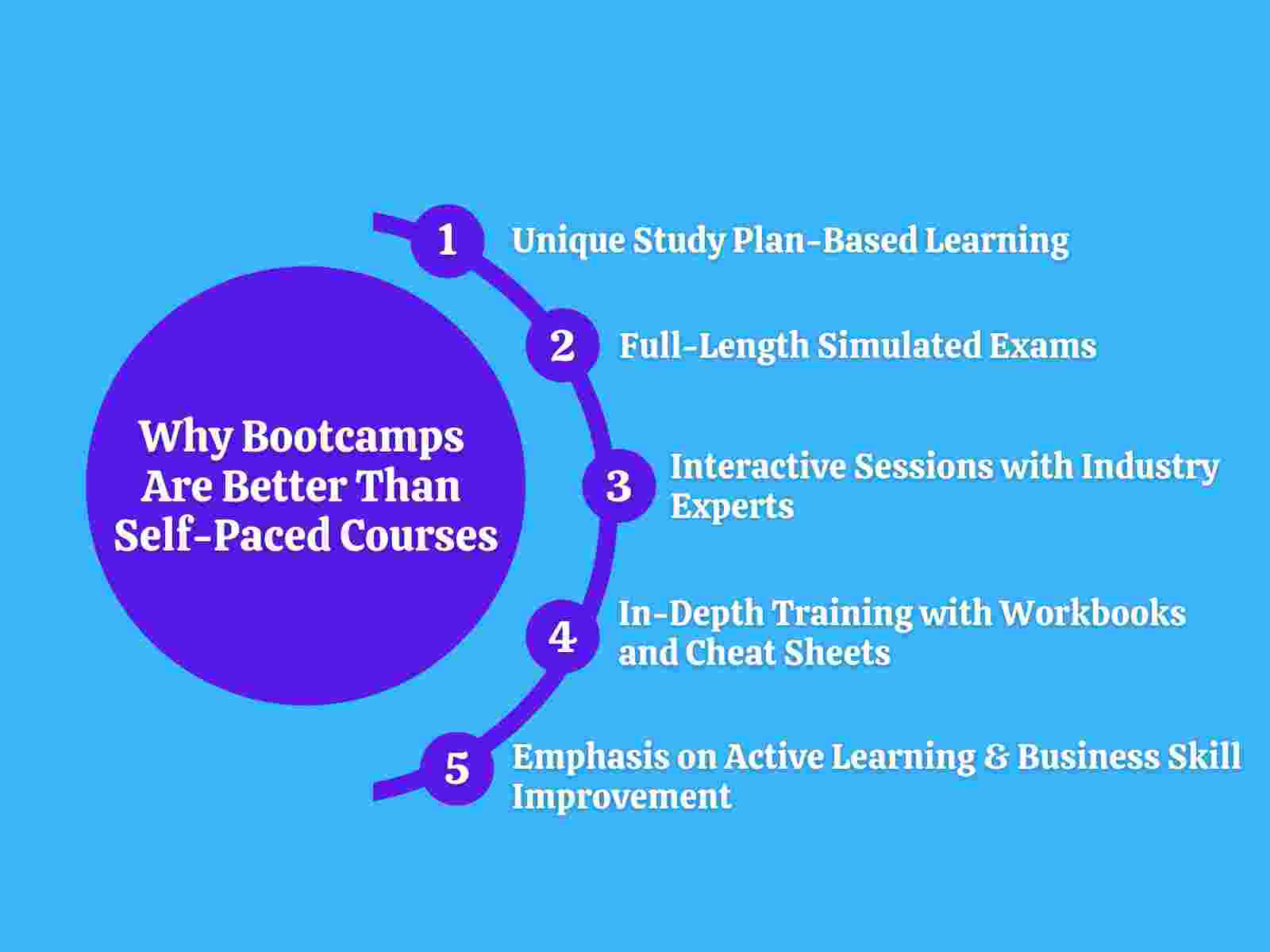
But what makes these 35 contact hours in bootcamps worth it?
- Bootcamps are known to help candidates retain information better because of applied learning techniques and expert guidance. Industry experts lead the classes and ensure the learning environment is immersive and engaging.
- Bootcamps facilitate result-based study and encourage practical learning.
- These programs enrich the experience with simulated exams, rigorous assessments, and applied learning methods to help candidates have a comprehensive understanding of advanced project management.
- They face problems they might encounter at work so they can hone their problem-solving skills.
- The lesson plans are well-structured and embedded with case studies and real-life examples.
PMP certification training is your door to moving from a conventional project manager to a successful project manager. Though you might feel tempted to dismiss it as yet another expensive professional test, PMP certification is a matchless credential that will set you apart from other candidates and give you an edge over the competition.
If you are aspiring to crack your PMP certification exam in a single attempt, bootcamp is your perfect choice of training. Apart from readily ensuring your 35 contact hours of project management education recommended by PMP, bootcamps offer expert guidance and exposure to real-life situations.
GreyCampus is a PMI Authorized Training Partner (ATP) and a leading provider of PMP training bootcamps. If you are looking for access to quality learning materials, simulated tests, practice questions, audio/video lectures, and assured 35 contact hours, GreyCampus is for you. The bootcamp is a six-month intensive training program designed to help candidates crack the PMP certification exam in one go. It guarantees unlimited access to live classes and one-year mentorship.
Want To Get PMP Certified? Enroll for a Bootcamp Now!